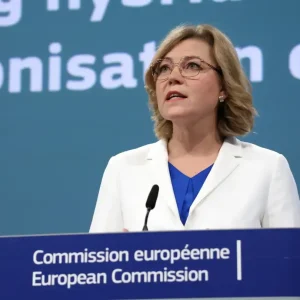
Gigabit broadband could be available to all European citizens and businesses by 2030 under EY proposals for a ‘Gigabit Infrastructure Act’. The Bloc is also updating its policy for regulators, and has also launched a consultation on the future of the connectivity and its infrastructure.

The EU say that The ‘Gigabit Infrastructure Act’ will be an update to the ‘2014 Broadband Cost Reduction Directive’, “responding to the growing demand for faster, more reliable and data-intense connectivity”.
The 2014 Directive has contributed to 90% of EU households being covered by networks of at least 30 Mbps speeds (as of 2021). However, to meet the objectives of Europe’s Digita Decade, the EU has proposed legislation to cover all households and businesses with gigabit and fast mobile networks by 2030.
“Given the increasing uptake of advanced digital technologies, there is an urgent need for more bandwidth at faster speeds to enable smarter, more flexible and more innovative services […] powered by the development and use of technologies, such as cloud, artificial intelligence (AI), data spaces, virtual reality and the metaverse and in which European citizens enjoy their digital rights,” the EU said in an announcement today.
The proposed legislation and guidance has been welcomed by the mobile network association, GSMA, but other stakeholders are concerned about the EU draft recommendations.
EU’s legislation will reduce ‘red tape’ when deploying gigabit networks
According to the EU Commission, the Gigabit Infrastructure Act aims to help challenge the “slow and costly deployment” of the underlying physical infrastructure that will sustain gigabit networks. It also believes that it will enhance the coordination of civil works between network operators, which represents up to 70% of the costs of network deployment.
It will also aim to remove the red tape that comes with deploying new networks by streamlining and speeding up the permit-granting procedure. Authorities will need to confirm the completion of a permit application within 15 days under the proposed legislation, with applications unanswered within four months to be considered “tacitly approved”.
The application process will also go fully digital. Operators will be enabled to access all the information they need on existing infrastructure and planned civil works online, explains the EU, with permit applications also carried out online.
The Gigabit Infrastructure Act will also mean that all new and majorly renovated buildings will be pre-equipped with fibre and the required infrastructure. The EU believes that this will help operators deploy networks at a lower cost – its impact assessment estimates that the reduced cost of network deployment would be €14.5bn, with public subsidies reducing by €2.4bn.
The European Parliament and Council will examine the proposed regulation. When adopted by the co-legislators, it will be applicable in all the EU Member States.
EU regulatory authorities can help accelerate network deployment
Aligned with the new Gigabit Infrastructure Act proposal is the EU’s draft Gigabit Recommendation, which will act as a guide for national regulatory authorities looking to deploy new networks. It will replace the ‘Access Recommendation’ that consists of the ‘2010 Next Generation Access Recommendation’ and the ‘2013 Non-discrimination and Costing Methodology Recommendation’.
The guidelines outline the conditions of access to telecom networks of operators with significant market power, which the EU believe will incentivise faster switch-off of legacy technologies. It should also accelerate gigabit network deployment, it says.
The EU says that the recommendations promote pricing flexibility for access to regulated networks and enable sustainable competition. Consumers in the EU can also enjoy the benefits of the single market for electronic communications in Europe, it says, by getting better services through higher quality networks without higher prices.
The draft recommendations are currently with the Body of European Regulators for a consultation, which will take two months. The EU will then adopt the final recommendation, which incorporates feedback from the regulators.
The EU considers the future of the telecoms sector
In addition to its new regulation and recommendations, the EU has invited telecoms industry stakeholders to contribute to its consultation on the future of the connectivity sector and its infrastructure.
According to the EU, it wants to identify the “types of infrastructure needed for Europe to keep ahead of transformative technological developments”. It also wants to get views on how to ensure the required investments are rolled out in a timely manner.
The EU has also reaffirmed its position that all players benefiting from digital transformation need to fairly contribute to investments in connectivity infrastructure, as well as its commitment to protecting a “neutral and open internet”.
“Today we are making sure that everyone, everywhere in the EU, has access to fast and secure connectivity. But high-speed internet requires high investments,” said Thierry Breton, commissioner for internal market. “That is why, in addition to facilitating network deployment in the short term, we are exploring the important question of who should pay for the next generation of connectivity infrastructure, including whether platforms should share the cost of investment in next-generation connectivity with telco operators.”
This could be through so-called “fair share” proposals, which would see Big Tech companies foot some of the costs of network infrastructure.
Mobile industry reacts to EU’s Gigabit legislation and recommendations
In January 2023, the draft Gigabit recommendations were leaked to Euractiv and caused a stir with stakeholders in Europe.
The European Competitive Telecommunications Association (ECTA), said at the time that the draft text had “stunned” them and publicly denounced it due to the absence of public consultation and the “strong adverse impact” it would have on the contestability of markets and gigabit network investment.
It also said that the proposed draft on the regulatory promotion of gigabit connectivity would conflict with several parts of the European Electronic Communications Code.
“In no circumstances can a recommendation solely issued by the European Commission depart from what is stipulated in the act providing for its legal basis or impose a forced interpretation thereto,” it said in a statement. “Overall, the intent of the text appears to revolve entirely around increasing the profitability of the ex-monopoly telecom operators in EU Member States, reversing 25 years of successful liberalisation and promotion of competition.”
Following the announcement today, John Giusti, chief regulatory officer of the mobile industry association, GSMA, said that it was right that the EU was looking at the realities of the digital economy and considering ways to expand future innovation and investment.
“In an increasingly digital world, Europe’s future economic success and social development will hinge on sustained investment in advanced communications networks,” he said. Giusti also commended the EU for taking leadership in initiating an “honest discussion” about the role companies were playing in using networks without contributing to investment.
“Today, only a handful of companies are generating more than half of all the traffic running over European networks,” he explained. “Exponential growth in this traffic is going to require more and more network investment.”
He added that it would be “only fair” for companies generating the largest amounts of traffic should contribute to the required infrastructure, rather than burdening European consumers and businesses.
Opponents of the “fair share” idea have warned that it could leave European infrastructure with critical weaknesses.






